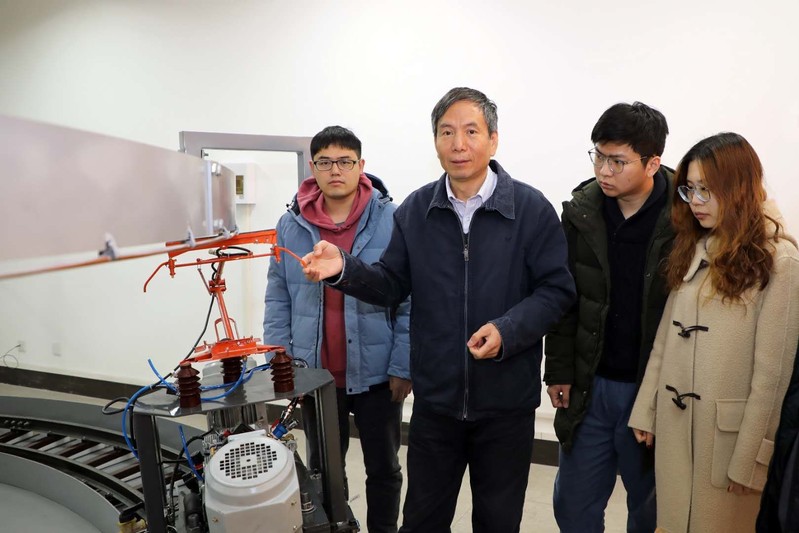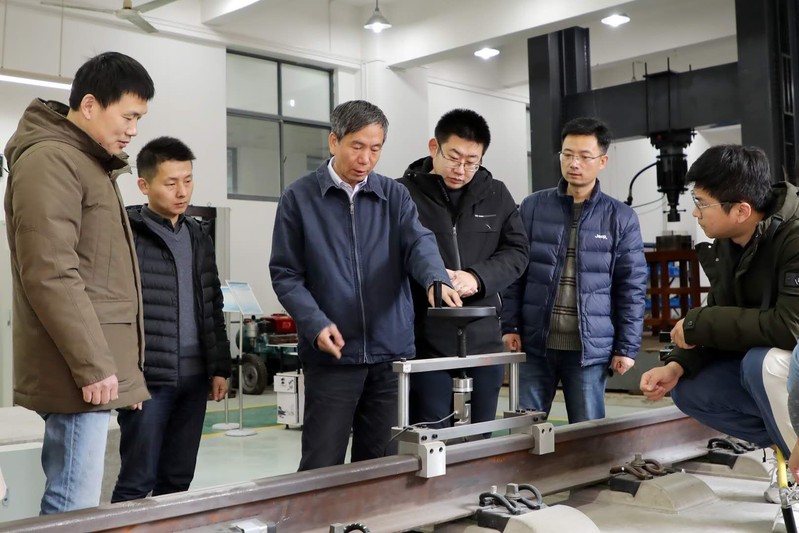
WANG Anbin has solved perennial problems plaguing the rail transport industry and scored great achievements that have been recognized worldwide. He developed the international leading vibration and noise reduction technology, which has been applied to more than 30 metro companies in China.
Profile:
WANG Anbin: Professor, School of Urban Railway Transportation, Shanghai University of Engineering Science; Director, Shanghai Research Center of Rail Transit Vibration and Noise Control Technology and Engineering; Director, Technical Committee of Urban Rail Transit Emergency Technology and Equipment Industry R&D Center, Ministry of Transport. Prof. WANG Anbin is engaged in the research and development of rail transit vibration and noise reduction technologies and applications. With more than 100 granted patents, he has overcome difficulties in the safe operation of rail transit and environmental protection.
Professor Wang was awarded as an advanced worker in Shanghai in 2020.

Achievements
WANG Anbin has worked in the UK rail transit industry for more than 20 years. 10 years ago, he returned to China as a specially-appointed expert of China’s National High-level Overseas Talents Introduction Program. Since then, cities across China have been vigorously developing rail transit, allowing him to fully exploit his talents. Unswervingly determined, WANG Anbin has solved perennial problems plaguing the rail transport industry and scored great achievements that have been recognized worldwide. He developed the international leading vibration and noise reduction technology, which has been applied to more than 30 metro companies in China, realizing significant social and economic benefits.
International leading vibration and noise reduction technology
Remarkable application effect
Born in 1961 in Xi’an, WANG Anbin was admitted to Xi’an Jiaotong University in 1978. In 1988, he went to the UK to study for a Ph.D. In 1990, he became a senior research fellow at the Research Institute of British Railways. Afterwards, he was in charge of R&D at British Rail. In 2010, WANG Anbin returned to China as a high-level overseas talent. After studying and working in the UK for 23 years, he returned to China with determination to serve his country wholeheartedly. In 2016, WANG Anbin was hired at Shanghai University of Engineering Science as a professor and the dean of the Rail Transit Research Institute.

For a long time, the “wheel-rail relationship” between vehicles and rails, and the “pantograph-catenary relationship” between vehicles and power supply systems have been plaguing the rail transport industry. Over the years, WANG Anbin has devoted himself to researching these two problems. He has designed and developed the “SFC/FC Fastener System” for high-speed tracks, untying the “rope” that limited the speed of the high-speed rail. The technology was first applied to the French Eastern Railway in 2007. To this day, it still holds the world record for the fastest train at 574.8 km/h. After he returned to China, the technology has been applied to the high-speed railway lines in the “Wuhan to Hefei” and “Shijiazhuang to Taiyuan” sections. At present, he is making every effort to achieve breakthroughs in the “pantograph-catenary relationship”. He has developed a new type of self-proprietary device that improves operational safety and component life by 5 to 10 times.

Reducing track vibration and noise is a tough challenge in the world today. WANG Anbin has undertaken major special research projects in China. He leads a group of researchers to carry out onsite research and online experiments. He and his team members have developed a series of new products for track vibration and noise reduction, which can significantly reduce ambient vibration by more than 10 decibels. The track damper he developed was first used in Nanjing Metro. In the past, the tracks had to be ground every 2 months. No grinding is required for 3 years after the damper was installed. In 2018, Metro Line 10 was the first in Shanghai to use the damper, achieving remarkable results. The product will be applied to more metro lines. In June last year, on-site verification tests were carried out on the Wenzhou Urban Railway, where steel rail dampers were installed. The results showed that the noise was reduced by more than 5 decibels. To date, the technology has been applied to more than 30 metro companies in China, realizing significant social and economic benefits.
China’s high-speed rail operating mileage is nearly 40,000 kilometers, accounting for 70% of the world’s total. Problems such as multiple wheel polygons and periodic wave wear of rails occur in railway operation, posing a threaten to driving safety. WANG Anbin proactively responded to the challenges. Year after year, he went to numerous high-speed rail sites, from the Beijing-Shanghai High-speed Railway with a temperature of minus ten degrees to the Shanghai high-speed train test base with a high temperature of more than 40 degrees, to name just a few. He finally developed the world’s first high-frequency abrasion excitation test device, and developed a new series of high-frequency damping fasteners to eliminate the abnormal damage to key parts of high-speed rail.
Stepping up efforts to train practice-oriented professionals
In 2005, Shanghai University of Engineering Science took the lead in establishing the School of Urban Railway Transportation in China to train professionals urgently needed for the development of rail transit. In September 2016, Wang Anbin led the establishment of the Rail Transit Research Institute, which focuses on rail transit research and application of scientific research results and training of practice-oriented professionals.
WANG Anbin believes that in addition to imparting knowledge and improving abilities, helping students establish a sense of social responsibility is a crucial task for the faculty. Students should not only have professional ability, but also shoulder social responsibility. The faculty, with their personal integrity, should do their best to transmit positive core values to students.
He places great emphasis on improving students’ abilities and teaching them practical methods, with a view to turning them into practice-oriented professionals. He never treats graduate students as “laborers”. Instead, he is willing to spend his time teaching them. Not only in the laboratory, but more often, he takes his students to tunnels, viaducts, railways, and rail systems for onsite testing and engineering applications. He advocates turning students into practice-oriented professionals in engineering applications. Over the past 4 years, WANG Anbin has trained over 20 postgraduates, who are “sought-after” professionals in rail transit companies and institutes across China. Mr. Wang said proudly: “None of the students trained by us can’t find a job.”
From the moment he joined the School of Urban Railway Transportation, WANG Anbin has been striving to achieve a goal: developing the School of Urban Railway Transportation into a first-class platform for technology, engineering application and talent training in China. He has set targets for himself: obtaining a patent every month to find solutions to problems existing in the field of rail transit. Over the years, the team led by him has been granted over 100 patents and won the first and second prizes of provincial and ministerial level scientific and technological progress awards for multiple times.
WANG Anbin said that in September next year, the International Workshop on Railway Noise will be held in China for the first time, and the venue will be located in Shanghai University of Engineering Science. Experts from around the globe will witness that Shanghai University of Engineering Science is a top performer in the field of vibration and noise reduction.
China has the world’s largest railway network. WANG Anbin devotes his experience accumulated in other countries for more than 20 years. Living in a golden age, he spares no effort to make China’s rail transit the best in the world in terms of safety, environmental protection and mobility。
